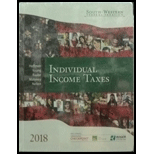
South-western Federal Taxation 2018: Individual Income Taxes
41st Edition
ISBN: 9781337385886
Author: William H. Hoffman, James C. Young, William A. Raabe, David M. Maloney, Annette Nellen
Publisher: Cengage Learning
expand_more
expand_more
format_list_bulleted
Question
Chapter 15, Problem 5RP
To determine
Explain whether the rule of exchange period for the like-kind property will change if the taxpayer involved in the exchange is located in a presidentially declared disaster area.
Expert Solution & Answer
Want to see the full answer?
Check out a sample textbook solution
Students have asked these similar questions
General accounting
Help with problem and accounting question
Please give me true answer this financial accounting question
Chapter 15 Solutions
South-western Federal Taxation 2018: Individual Income Taxes
Ch. 15 - Prob. 1DQCh. 15 - Prob. 2DQCh. 15 - Prob. 3DQCh. 15 - Prob. 4DQCh. 15 - LO.2 Melissa owns a residential lot in Spring...Ch. 15 - LO.2 Ross would like to dispose of some land he...Ch. 15 - Prob. 7DQCh. 15 - Prob. 8DQCh. 15 - Prob. 9DQCh. 15 - Prob. 10DQ
Ch. 15 - Prob. 11DQCh. 15 - Prob. 12DQCh. 15 - Prob. 13DQCh. 15 - Prob. 14DQCh. 15 - Prob. 15DQCh. 15 - Prob. 16CECh. 15 - Prob. 17CECh. 15 - Prob. 18CECh. 15 - Prob. 19CECh. 15 - Prob. 20CECh. 15 - LO.3 Camilos property, with an adjusted basis of...Ch. 15 - Prob. 22CECh. 15 - Prob. 23CECh. 15 - Prob. 24CECh. 15 - Prob. 25CECh. 15 - Prob. 26CECh. 15 - Prob. 27PCh. 15 - Prob. 28PCh. 15 - Prob. 29PCh. 15 - Prob. 30PCh. 15 - Prob. 31PCh. 15 - Prob. 32PCh. 15 - Prob. 33PCh. 15 - Ed owns investment land with an adjusted basis of...Ch. 15 - Prob. 35PCh. 15 - Prob. 36PCh. 15 - Prob. 37PCh. 15 - Prob. 38PCh. 15 - Prob. 39PCh. 15 - Prob. 40PCh. 15 - LO.3 Howards roadside vegetable stand (adjusted...Ch. 15 - Prob. 42PCh. 15 - Prob. 43PCh. 15 - Prob. 44PCh. 15 - Prob. 45PCh. 15 - Prob. 46PCh. 15 - What are the maximum postponed gain or loss and...Ch. 15 - Prob. 48PCh. 15 - Prob. 49PCh. 15 - Prob. 50PCh. 15 - Prob. 51PCh. 15 - Prob. 52PCh. 15 - Prob. 53PCh. 15 - Prob. 54PCh. 15 - Prob. 55PCh. 15 - Prob. 56PCh. 15 - Prob. 57CPCh. 15 - Prob. 1RPCh. 15 - Prob. 2RPCh. 15 - Taylor owns a 150-unit motel that was constructed...Ch. 15 - Prob. 5RPCh. 15 - Prob. 1CPACh. 15 - Chad owned an office building that was destroyed...Ch. 15 - Prob. 3CPACh. 15 - Marsha exchanged land used in her business in...Ch. 15 - Prob. 5CPACh. 15 - Prob. 6CPA
Knowledge Booster
Similar questions
arrow_back_ios
SEE MORE QUESTIONS
arrow_forward_ios
Recommended textbooks for you
 Individual Income TaxesAccountingISBN:9780357109731Author:HoffmanPublisher:CENGAGE LEARNING - CONSIGNMENT
Individual Income TaxesAccountingISBN:9780357109731Author:HoffmanPublisher:CENGAGE LEARNING - CONSIGNMENT

Individual Income Taxes
Accounting
ISBN:9780357109731
Author:Hoffman
Publisher:CENGAGE LEARNING - CONSIGNMENT




